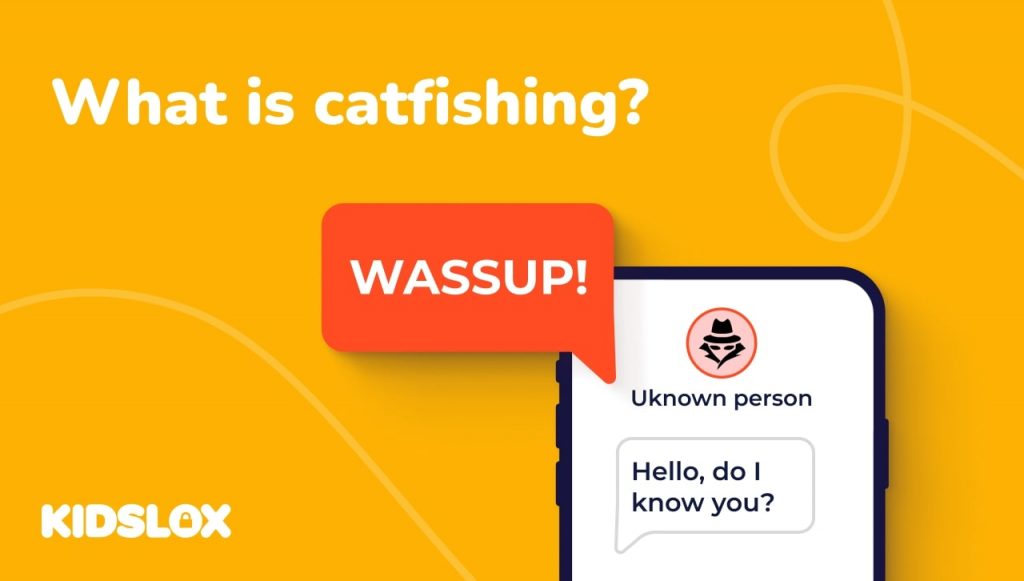Have you ever wondered if someone you engage with online is truly who they say they are?
With the rise of social media and online dating, catfishing – where someone lures another into a relationship by adopting a false persona – has become more common.
Catfishing can have devastating consequences, both emotionally and financially.
While many high-profile celebrities and public figures have been the victim of catfishing, it can happen to anyone – even kids. It’s important to teach your children about the dangers of talking to strangers online, and how to spot the signs of a catfish.
To help ensure that you and your children are safe online, here’s what you need to know about catfishing:
Article At A Glance:
- What is catfishing?
- Different types of catfishing behavior
- What are the signs of a catfish?
- How can I report a catfish?
- How can I protect myself and my children from catfishing?
Once you read this article, you will be better equipped to deal with a catfish should you encounter one online. So, let’s get started!
Catfishing Defined
A dangerous behavior with an unusual name, catfishing is when someone creates a false identity online – often using social media or dating apps – in order to take advantage of another person.
But why is it called catfishing? The original use of the term “catfish” is disrupted by most scholars, but many believe its roots can be found in old fishing tales.
For example, some believe that the term stems from the practice of putting catfish in with cod to keep the cod agile on long voyages.
This practice was started by a man who wanted to improve the quality of cod that was being shipped from Alaska to China. The deceptive catfish would then keep the codfish healthy and agile in the storage tanks.
Others trace the term back to old Christian parables, in which a catfish was used as a symbol for a person who pretends to be something they’re not.
Regardless of its origins, the term “catfish” is now commonly used to describe someone who creates a false online persona. This can be done for various reasons, but most often, it’s done to take advantage of someone else – emotionally, financially, or both.
There are many different types of catfishing behavior – each with their own motivations and methods. Here are some of the most common:
Romance scams: where the catfish poses as a love interest in order to gain someone’s trust and then asks for money
Example: A catfish might pose as a soldier who is deployed overseas and then ask for money to help with travel expenses so that he can come home and visit.
Financial scams: where the catfish poses as a professional or business contact in order to get access to someone’s financial information
Example: A catfish might message someone on LinkedIn, claiming to be a recruiter for a well-known company. The catfish will then try to get the person to share their resume – which often includes sensitive financial information – so that they can “help” them get a job.
Friendship scams: where the catfish poses as a potential friend in order to gain someone’s trust and then asks for money
Example: A catfish might message someone on Facebook, claiming to be a long-lost friend. Once the person responds, the catfish will then try to get them to send money – often by asking for help with travel expenses or medical bills.
Catfishing for attention: where the catfish creates a false persona in order to gain attention or validation
Example: A catfish might create a fake profile on a dating app and then message people, asking for compliments or attention. They might also send unsolicited photos or videos – often of a sexual nature.
These are just some of the most common types of catfishing behavior – there are many others out there. No matter the motivation, catfishing can have serious consequences for both the victim and the perpetrator.
What is Catfishing in Online Dating?
While catfishing can happen in any online interaction, it is most common on dating apps and websites. In fact, one study found that one in ten profiles on free dating sites are fake.
That’s a pretty significant number, and it’s likely that many of these fake profiles are created by catfish. After all, what better way to take advantage of someone looking for love than by pretending to be their perfect match?
Online dating proves a fertile ground for catfishers because there are so many potential victims and so little verification. When you’re looking for love online, it’s important to be aware of the signs of a catfish – otherwise, you could find yourself in a dangerous situation.
What is Catfishing in Social Media?
Catfishing is also common on social media, where people often create fake profiles to gain followers or to harass others.
One of the most famous examples of this is the case of “Manti Te’o,” a college football player in the United States who was duped by a catfish posing as his girlfriend.
Over time, Te’o sentimentalized the relationship, even talking about her in interviews. It wasn’t until after she “died” of cancer that he learned she never existed.
While this story may be extreme, it highlights how easy it is to get caught up in a fake social media relationship. If you’re not careful, you could find yourself in a similar situation.
Why Do People Catfish?
There are many reasons why people catfish others. Some do it for financial gain, while others do it to get revenge or to take advantage of someone emotionally.
In some cases, catfishing is a form of online bullying. The catfish creates a fake profile and uses it to harass or intimidate their victim. This can be especially damaging to young people, who may be particularly vulnerable to online bullying.
In general, most catfish are motivated by a need for attention or power. They create false identities in order to take advantage of others, and they often target people who are vulnerable.
Signs You May Be Dealing With A Catfish
Now that you know what catfishing is and some of the different ways it can manifest, you’re probably wondering how to spot a catfish. Here are some signs to look out for:
They refuse to video chat or meet in person.
If someone you’re talking to online refuses to meet up with you or video chat, that’s a red flag. They may be using a fake profile picture, and they don’t want you to see their real face.
They have an unverified back story.
Does the person you’re talking to have a vague or unbelievable back story? They may be making up lies about their life in order to gain your trust.
They’re always available.
Does it seem like this person is always available to talk, even if it’s late at night? That’s because they’re probably not really who they say they are.
Catfish often create fake profiles using stolen photos and information, so they’re not really tied down to one person.
They ask for money.
This is a big one. If someone you’ve never met is asking you for money, that’s a huge red flag. They may be trying to scam you out of your hard-earned cash.
What are the Dangers of Catfishing?
While catfishing may seem like harmless fun, it can actually be quite dangerous.
Remember, most people who catfish are motivated by a need for attention or power. This means they’re often willing to lie, cheat, and even hurt people to get what they want.
In some cases, catfish have been known to steal money or personal information from their victims. In other cases, they’ve harassed or even threatened people online.
In the worst cases, catfish have been known to lure their victims into dangerous situations. This can create a real risk of physical harm, or even death.
Are there Psychological Effects of Catfishing?
While there are many risks to physical well-being and financial security, there are also risks to mental health. Dealing with a catfish can be a very traumatic experience, especially if the relationship was long-term or intimate.
Victims of catfishing often suffer from anxiety, depression, and low self-esteem. They may also have difficulty trusting people in the future. The impact of having been betrayed in this way can be very damaging.
Fortunately, there are steps you can take to prevent yourself and your children from being catfished. In the next section, we’ll discuss some tips on how to stay safe online.
What Should I Do If I Think I’m Being Catfished?
If you think you’re being catfished, there are a few steps you can take to ensure your safety and protect yourself from harm:
- Stop talking to the person: If you think you’re being catfished, the first thing you should do is stop talking to the person. This will help prevent them from gaining more information about you, and it will also protect your emotional well-being.
- Block the person: Once you’ve stopped talking to the person, be sure to block them on all of your social media accounts. This will help prevent them from contacting you in the future.
- Report the person: If you’re being harassed or threatened by a catfish, you should report them to the police. This will help ensure that they are held accountable for their actions, and it will also help protect other potential victims.
- Become educated on the subject: Finally, it’s important to become educated on the subject of catfishing. This will help you avoid becoming a victim in the future, and it will also help you protect your loved ones from potential harm.
How Can I Prevent My Child from Being Catfished?
If you’re a parent, it’s essential to talk to your child about the dangers of catfishing. Here are some tips to help you get started:
1. Teach your child the importance of online safety.
One of the most important things you can do is teach your child the importance of online safety. This includes things like never sharing personal information with strangers, and only meeting people in person who they’ve met online.
It’s also important to teach your child how to spot the signs of a catfish. If they know what to look for, they’ll be less likely to fall victim to one. If they do spot a potential catfish, they should know to come to you for help.
2. Monitor your child’s online activity.
It’s also important to monitor your child’s online activity. This includes things like knowing who they’re talking to, and what sites they’re visiting. If you see anything that makes you concerned, don’t hesitate to reach out to a trusted adult for help.
One way to monitor your child’s online activity is to use a parental control app like Kidslox. By monitoring your child’s online activity, you can help ensure their safety and protect them from potential harm.
3. Take steps immediately if you think your child is being catfished.
If you think your child is being catfished, it’s important to take action immediately. This includes things like talking to your child about what’s going on and involving the police if necessary.
Taking immediate action can help protect your child from further harm, and it can also help you get the information you need to catch the catfish.
4. Keep the lines of communication open.
Finally, it’s important to keep the lines of communication open with your child. This means having regular conversations about online safety, and being there for them if they ever have any concerns.
By keeping the lines of communication open, you can help ensure that your child feels comfortable coming to you with any concerns they may have.
Protect Your Children from Catfishing and More with Kidslox
At Kidslox, we understand the importance of online safety. That’s why we have designed a state-of-the-art parental control app that can help you protect your child from potential dangers like catfishing.
With Kidslox, you can monitor your child’s online activity, block dangerous apps and websites, and set time limits for their devices.
When you know your kids are protected, you can have peace of mind knowing that your child is safe online. With a single Kidslox account, you can manage all of your family’s devices from one convenient dashboard.
From setting time limits to blocking dangerous apps, Kidslox gives you the power to protect your children from the ever-growing list of online dangers.
Try Kidslox today and see how easy it is to keep your family safe online. With Kidslox, you can have peace of mind knowing that your children are protected from the potential harm of catfishing and much more!







